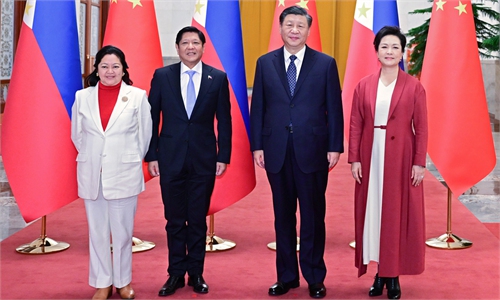China, Philippines ink updated MoU on BRI to boost cooperation in infrastructure, other areas

A view of Coron Island in Palawan, Philippines Photo: VCG
During President Ferdinand Romualdez Marcos Jr of the Philippines' three-day visit to China, which concluded on Thursday, China and the Philippines signed a total of 14 cooperation documents. One of the major documents was an updated Memorandum of Understanding (MoU) on the Belt and Road Initiative (BRI) with a focus on bilateral cooperation in infrastructure projects.
The two countries first signed the MoU on the BRI in November 2018 and the updated version will further promote closer BRI cooperation, which will underpin the expansion of economic and trade cooperation between the two countries, Chinese experts noted.
In terms of broad bilateral cooperation, during the visit, the two countries also vowed cooperation in various areas ranging from energy to agriculture, where the potential for collaboration is huge. Closer economic and trade ties between the two countries also showed that attempts by external forces, particularly the US, to instigate tension by hyping issues related to the South China Sea are futile, experts added.
Major projects
The signing of the MoU provides an institutional guarantee for future cooperation between the two countries, as it elevates cooperation on specific projects to a strategic level, which will help further reduce any potential risks, Xu Liping, director of the Center for Southeast Asian Studies at the Chinese Academy of Social Sciences, told the Global Times on Thursday.
"The signing of the updated MoU also shows that the two countries focus on medium and long-term cooperation," he said.
In addition to the updated MoU, the two countries also signed documents on several major infrastructure projects, including the Framework Agreement on Priority Bridges Crossing Pasig-Marikina River and Manggahan Floodway Bridges Construction Project, according to a joint statement released on Thursday.
They also discussed loan agreements that would support Philippine infrastructure development and vowed to further strengthen infrastructure cooperation with big projects such as Davao-Samal Island Bridge.
Overall, infrastructure cooperation is one of the key areas for bilateral cooperation, analysts noted.
Such cooperation on infrastructure is based on the strong complementarity between the two economies and their respective needs for economic development, Xu Ningning, executive president of the China-ASEAN Business Council, told the Global Times on Thursday.
Key projects such as the China-built Davao-Samal Island Bridge, which has recently broken ground, will help improve the local transportation system and meet the Philippines' economic development needs, experts noted.
Contracted by China Road & Bridge Corporation, a subsidiary of China Communications Construction Company, the bridge is a flagship project between the Chinese and Philippine governments. Once operational, the bridge will help shorten travel time between Davao and Samal Island, and revitalize the local economic and tourism activities, while facilitating the development of logistics and trade, according to experts.
The construction of infrastructure like bridges offer a practical boost to regional transport connectivity and the economic development of the Philippines, which has a huge room for infrastructure construction, Liu Zongyi, secretary-general of the Research Center for China-South Asia Cooperation at Shanghai Institutes for International Studies, told the Global Times on Thursday.
Chinese enterprises have actively participated in the construction of road bridges, ports, power stations, housing, water conservancy and other projects in the Philippines. So far, nearly 40 intergovernmental cooperation projects have been carried out, covering many fields such as epidemic prevention, disaster relief, road bridges, and agricultural cooperation.
More potential
In addition to the MoU on the BRI, both sides also vowed to expand cooperation in the energy sector. They agreed to resume discussions on oil and gas development at an early date and the two sides also agreed to explore cooperation in such areas as solar-power, wind energy, electric vehicles, and nuclear energy for electricity generation, according to the joint statement.
Cooperation in energy is also mutually beneficial for both sides and has huge potential after years of cooperation, Xu Liping said. "Such cooperation requires both parties to further develop ideas, and explore more mutually beneficial projects," he said.
The two countries signed an MoU on cooperation on oil and gas development in 2018.
On Thursday, the two sides also agreed to strengthen agricultural cooperation, with several corresponding documents being signed, including the Action Plan on Agriculture and Fisheries Cooperation (2023-25), the handover certificate of Sino-Philippine Center for Agricultural Technology-Technical Cooperation Program Phase III, and the Protocol Agreeing on the Phytosanitary Requirements for Philippine Fresh Durian Exports to China.
Such moves underlined efforts by the two major agricultural countries to further tap new opportunities in the agricultural sector.
As close neighbors separated only by a strip of water, the economic and trade cooperation between China and the Philippines has continued to deepen in recent years.
China has been the largest trading partner for the Philippines for six consecutive years, while the value of new contracts signed by Chinese firms in the Philippines nearly tripled and the annual scale has exceeded $10 billion, according to the China-ASEAN Business Council.
"Facing the current unfavorable factors such as the turmoil in the international situation, the sluggish world economic growth, and the COVID-19 pandemic, China and the Philippines, which live next to each other, should further enhance cooperation and fully develop the economic and trade complementarity between the two countries," Xu Ningning said.
In addition to bilateral cooperation, the two countries also look forward to expanding regional cooperation, with focus on increased economic and social connectivity and development, centering around trade and investment liberalization and facilitation, new modes of industrialization, digitization, low-carbon development and agricultural modernization, according to the joint statement.

